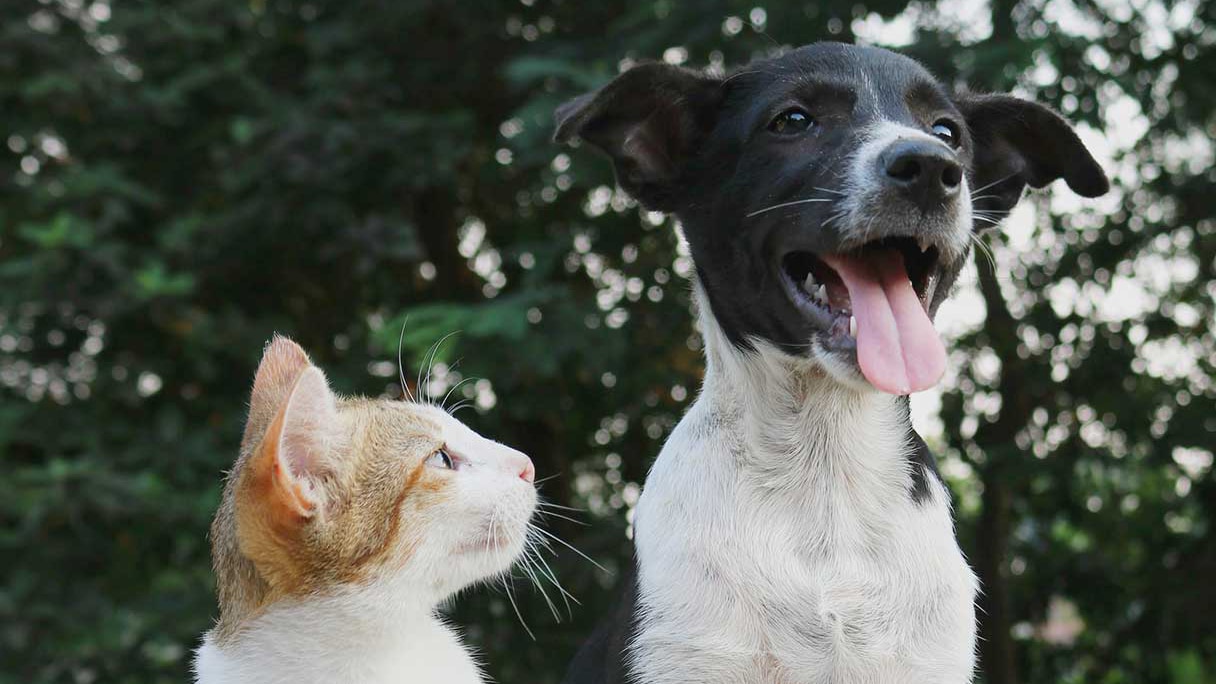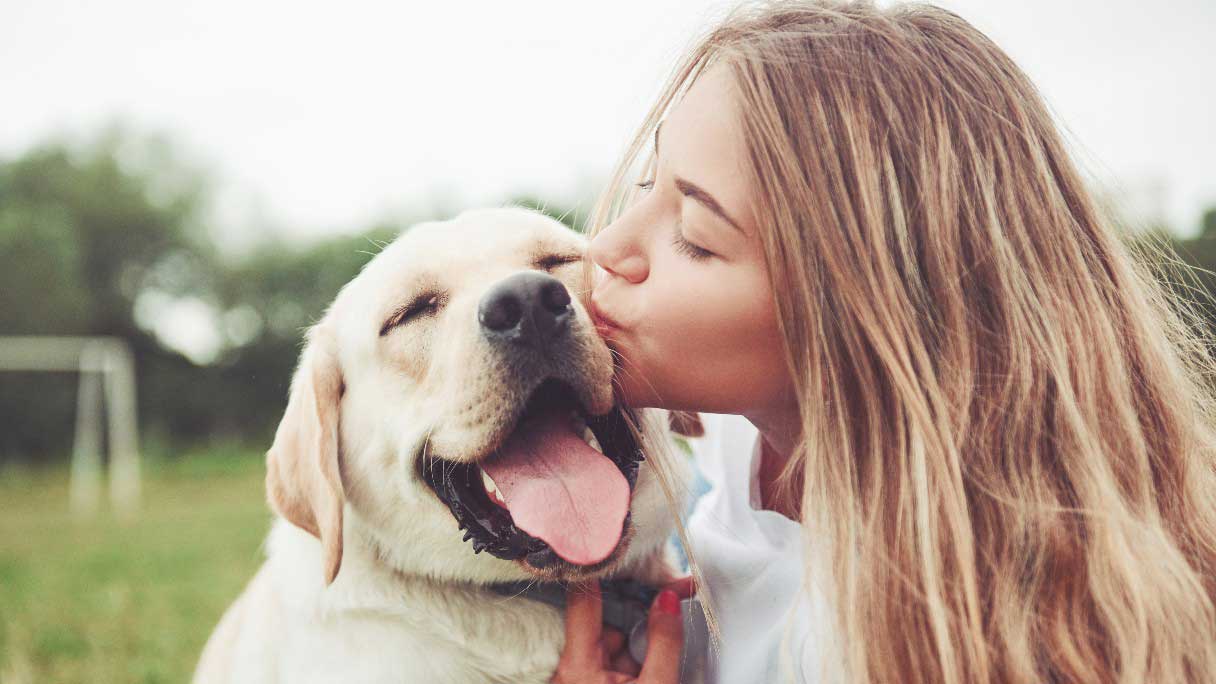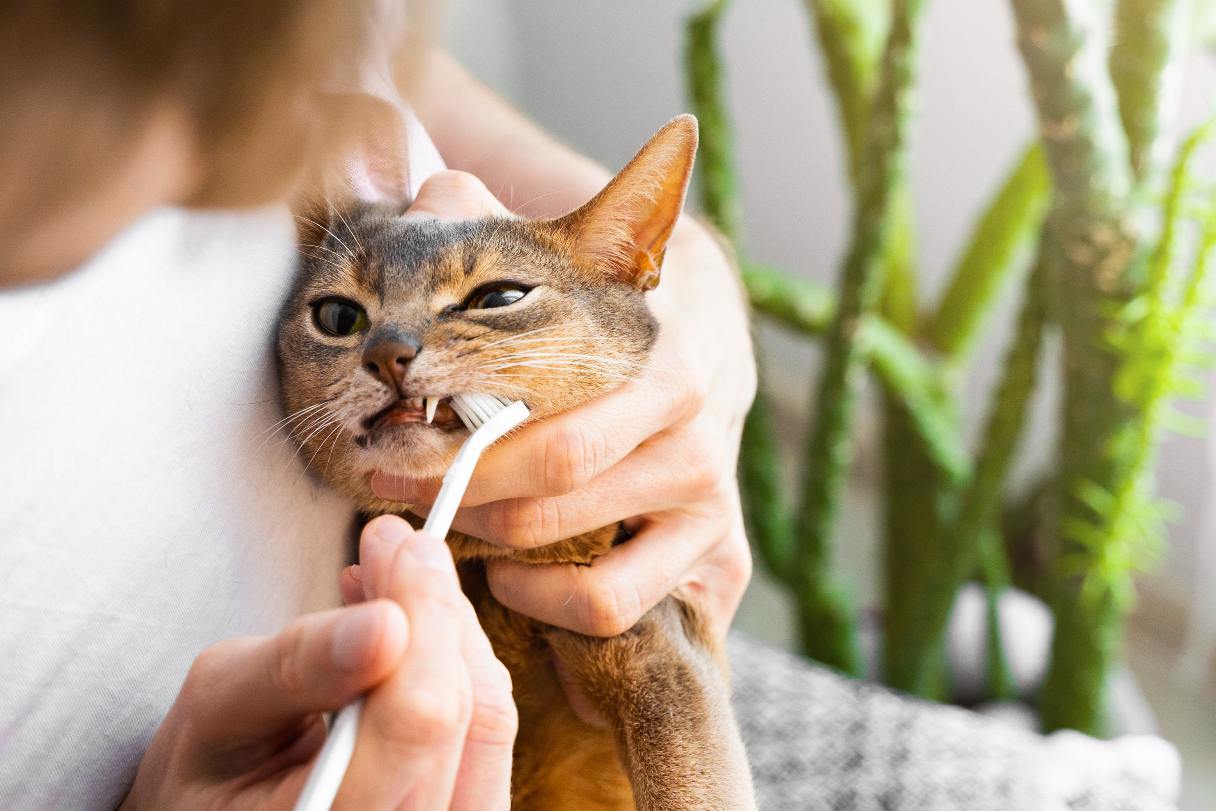Dogs and cats are just as prone to plaque, tartar and gum disease as humans, and they often don't have the benefit of regular brushing. A professional teeth cleaning done by your veterinarian on a yearly basis can help prevent dental diseases and other health issues — some of which could even shorten your pet's life.1
Read on to find out how dental cleanings for your furry friends can help them lead healthy lives and how much these cleanings cost.
What Is Dental Cleaning for Dogs and Cats?
Veterinary dental cleaning for both dogs and cats uses scaling tools to remove plaque and tartar from above and below the animals' gumline.2 It's important to clean the buildup below the gumline to help prevent tooth decay and gum disease.3
Because pets generally don't hold still for this uncomfortable procedure, veterinarians place pets under anesthesia to ensure a thorough, pain-free cleaning and reduce the chance of gum injuries.3
Does Your Dog or Cat Need a Dental Cleaning?
If you notice your pet has bad breath, discolored teeth, abnormal chewing, drooling, reduced appetite, bleeding from the mouth or swelling, they should be checked immediately by a veterinarian or board-certified veterinary dentist.1
While regular toothbrushing at home can help reduce plaque on the exposed part of the tooth above the gumline, professional teeth cleaning is the only effective way to clean what's hidden beneath the gums.3
Without professional cleanings and treatment, periodontal disease is likely to worsen with age. Advanced periodontitis can not only cause severe pain and loss of your pet's teeth, but can also lead to kidney, liver and heart problems.1
Having your pet's teeth professionally cleaned on a yearly basis also gives your vet a chance to examine their mouth for other potential issues, including tooth infections, mouth abscesses or tumors, broken teeth and other potential dental problems that need to be treated.1
Costs for Cat and Dog Dental Cleanings
The national average cost* of a veterinary dental cleaning for dogs is $388, but ranges from $307 to $702. For cats, the average cost* for teeth cleaning is $375 and ranges from $300 to $682.4
Other than your location, these factors can also impact the final cost of your dog's or cat's teeth cleaning:4
- The type of veterinary clinic or hospital where the procedure is done
- The size and weight of the pet
- Whether tooth extractions or additional procedures are needed
- Medications to treat periodontal disease or other issues
Average cost of cat and dog teeth cleanings by state/district
Below are the average costs* of cat and dog teeth cleanings by state/district:4
| State/Districy | Average cost (cat) | Average cost (dog) |
|---|---|---|
| Alabama | $331 | $324 |
| Alaska | $471 | $461 |
| Arizona | $407 | $400 |
| Arkansas | $327 | $321 |
| California | $527 | $518 |
| Colorado | $402 | $391 |
| Connecticut | $424 | $416 |
| Delaware | $388 | $380 |
| District of Columbia | $539 | $524 |
| Florida | $389 | $382 |
| Georgia | $346 | $340 |
| Hawaii | $710 | $696 |
| Idaho | $386 | $380 |
| Illinois | $357 | $353 |
| Indiana | $342 | $336 |
| Iowa | $340 | $333 |
| Kansas | $328 | $322 |
| Kentucky | $350 | $347 |
| Louisiana | $351 | $344 |
| Maine | $413 | $408 |
| Maryland | $437 | $430 |
| Massachusetts | $549 | $543 |
| Michigan | $342 | $337 |
| Minnesota | $362 | $354 |
| Mississippi | $317 | $310 |
| Missouri | $335 | $330 |
| Montana | $392 | $384 |
| Nebraska | $352 | $348 |
| Nevada | $383 | $376 |
| New Hampshire | $428 | $421 |
| New Jersey | $433 | $427 |
| New Mexico | $353 | $346 |
| New York | $464 | $458 |
| North Carolina | $371 | $364 |
| North Dakota | $347 | $344 |
| Ohio | $356 | $352 |
| Oklahoma | $325 | $317 |
| Oregon | $424 | $417 |
| Pennsylvania | $362 | $354 |
| Rhode Island | $426 | $418 |
| South Carolina | $363 | $356 |
| South Dakota | $349 | $344 |
| Tennessee | $342 | $338 |
| Texas | $350 | $344 |
| Utah | $392 | $385 |
| Vermont | $432 | $427 |
| Virginia | $382 | $374 |
| Washington | $433 | $427 |
| West Virginia | $318 | $313 |
| Wisconsin | $365 | $359 |
| Wyoming | $360 | $353 |
Calculate the cost of a dog/cat teeth cleaning near you

Explore procedure costs in your area
Does Pet Insurance Cover Teeth Cleaning for Pets?
While some pet insurance companies may include coverage for certain tooth or mouth injuries or conditions in their basic accident and illness coverage plans, not all cover the cost of routine dental cleanings. However, many pet insurance providers feature add-on wellness and dental plans beyond their standard coverage, which include benefits for teeth cleaning and other routine healthcare. Check the details of your pet insurance policy to see what's covered, or talk to your pet insurance company about how to get coverage for pet dental care.5
If your pet insurance doesn't cover the cost, or you do not have pet insurance, you can expect to pay the full amount, which can range* from $113 to $750.4
How a Vet Cleans Your Pet's Teeth
Before your vet performs a dental cleaning on your dog or cat, they'll likely require a separate appointment to examine them. This can help the vet determine whether a cleaning is actually needed, as well as assess what additional procedures or treatments may be required. The vet may also run blood tests to check your pet's liver, heart and kidneys to ensure they're healthy enough to undergo anesthesia.2
Once your pet arrives at their teeth cleaning appointment, the process typically follows these steps:3
- They'll be given a sedative and pain medication in preparation for the procedure, and then placed under general anesthesia.
- Dental X-rays will be taken to check for any tooth or bone damage that can't otherwise be detected.
- Scaling tools will be used to scrape plaque, tartar and calcium deposits off each tooth, both above and beneath the gumline.
- Your vet will likely conduct a thorough mouth exam and take measurements for your pet's chart, which will help the clinic keep track of changes in your pet's oral health.
- If necessary, your vet will remove any damaged or diseased teeth. Typically, someone from the clinic will call you to explain your pet's condition and get your consent prior to extractions or other additional procedures.
- Your pet's teeth will be polished and treated with a protective sealant, and then their mouth will be thoroughly rinsed prior to moving them to the recovery area and allowing them to wake up.
- Your pet will be monitored as they recover. If all is well, you'll be allowed to pick them up and take them home once they're awake.
Potential Side Effects
Pet dental cleanings are generally very safe. The use of anesthesia prevents your pet from moving or thrashing around, which vastly reduces the chance of injury from the dental equipment. While anesthesia itself comes with potential side effects, today's veterinary anesthesia practices are safer than ever, and the benefits far outweigh the potential complications. Vets generally exercise extreme caution in only using anesthesia on pets who are healthy enough to withstand it.1
Recovery and Aftercare
Your vet will provide instructions for caring for your pet at home after the procedure. This may include directions for administering medications, if any are needed, as well as stitch care if any teeth were extracted.
Your pet might be wobbly until the anesthesia fully wears off. It's a good idea to keep an eye on them to help them walk if necessary, keep them away from stairs or high places and make sure they don't fall asleep in their water bowl.
Taking Care of Your Pet's Teeth at Home
Plaque begins building up again almost immediately following a tooth cleaning.2 The best way to help your pet's teeth stay clean and healthy and reduce the need for professional dental cleanings is with regular toothbrushing.1 Daily brushing of your cat's teeth or dog's teeth with pet-safe toothpaste is best, but if that's too difficult, brushing a few times a week can still make a big difference.1 However, you should never use toothpaste for humans, which may contain fluoride and other potentially toxic ingredients, on your pets.6
For dogs or cats who won't tolerate toothbrushing, ask your vet about alternatives. Dental treats and chews, tooth wipes and even pet food formulated to promote dental health may be options that can help slow plaque buildup and help your dog's or cat's teeth stay healthy longer.1
Frequently Asked Questions About Cat and Dog Teeth Cleaning
Looking for quick answers about getting your pet's teeth cleaned? Here are some commonly asked questions.
CareCredit Credit Card Financing for Dogs and Cats
Taking good care of your pet's well-being from nose to tail is essential. Make sure to stay up to date on their regular checkups at the vet to help keep your pet happy and healthy for a lifetime of love. You can use your CareCredit credit card for pet care throughout the year for routine veterinary services as well as emergencies and surgeries.** Use our Acceptance Locator to find a veterinarian near you that accepts CareCredit.
CareCredit is there for you and your pet every step of the way; continue your wellness journey by downloading the CareCredit Mobile App to manage your account, find a provider on the go and easily access the Well U blog for more great articles, podcasts and videos.
In addition to pet care, you can also use your CareCredit credit card for dentistry, cosmetic, vision, hearing, health systems, dermatology, pharmacy purchases, spa treatments and so much more within the CareCredit network. How will you invest in your health and wellness next?
Author Bio
Jean Marie Bauhaus is a freelance writer and novelist who has been writing pet content since 2013. Her work has appeared on Forbes.com, Hill's Pet, Chewy, AKC.org and more.








